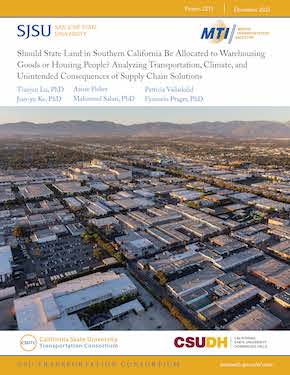- 408-924-7560
- mineta-institute@sjsu.edu
- Donate
Should State Land in Southern California Be Allocated to Warehousing Goods or Housing People? Analyzing Transportation, Climate, and Unintended Consequences of Supply Chain Solutions
In response to COVID-19 pandemic supply chain issues, the State of California issued Executive Order (EO) N-19-21 to use state land to increase warehousing capacity. This highlights a land-use paradox between economic and environmental goals: adding warehouse capacity increases climate pollution and traffic congestion around the ports and warehouses, while there is a deficit of affordable housing and high homeless rates in port-adjacent underserved communities. This study aims to inform regional policymakers and community stakeholders about these trade-offs by identifying current and future supply of and demand for warehousing and housing in Southern California through 2040. The study uses statistical analysis and forecasting, and evaluates across numerous scenarios the environmental impact of meeting demand for both with the Community LINE Source Model. Warehousing and housing are currently projected to be in high demand across Southern California in future decades, despite short-run adjustments in the post-pandemic period of inflation and net declines in population. Using state land for warehousing creates environmental justice concerns, as the number of air pollution hotspots increases even with electrifying trucking fleets, especially when compared against low-impact affordable housing developments. However, low-income housing demand appears to be positively correlated with unemployment, suggesting that the jobs provided by warehousing development might help to ameliorate that concern.
TIANJUN LU, PHD
Dr. Lu (Principal Investigator) is an Assistant Professor in the Department of Earth Science and Geography at California State University, Dominguez Hills. His academic research and interests focus on transportation planning, air pollution exposure assessment, and environmental health.
JIAN-YU (FISHER) KE, PHD
Dr. Ke is an Associate Professor in the Department of Information Systems & Operations Management at California State University, Dominguez Hills. His academic research and interests focus on global supply chain management and manufacturing strategies.
FYNNWIN PRAGER, PHD
Dr. Prager is an Associate Professor of Public Administration at California State University, Dominguez Hills, Co-Director of the South Bay Economic Institute, and Director of the School of Public Service and Justice. His academic research and interests focus on transportation systems and the policy and economics of disasters.
MAHMOUD SALARI, PHD
Dr. Salari is an Assistant Professor of Economics at California State University, Dominguez Hills. His academic research and interests focus on energy economics, environmental policy, transportation economics, sustainable transportation, and big data analysis.
PATRICIA VALLADOLID
Patricia is the Director of Community Development with Century Housing. Her expertise includes affordable housing, community resilience, and community engagement.
AZURE FISHER
Azure is a second-year graduate student in the Environmental Science Masters Program at California State University, Dominguez Hills. Her research focuses on environmental justice and air pollution exposure assessment.
-
Contact Us
San José State University One Washington Square, San Jose, CA 95192 Phone: 408-924-7560 Email: mineta-institute@sjsu.edu






